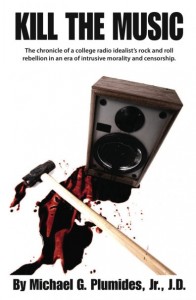I love reading stories about radio and every time I run across a college radio mention in a book, my interest in piqued. In the months to come I’m going to work on compiling a list of college radio “must reads,” from the academic to the autobiographic. My first pick: Kill the Music.
Kill the Music: The Chronicle of a College Radio Idealist’s Rock and Roll Rebellion in an Era of Intrusive Morality and Censorship is a new book by Michael Plumides that in part looks back at his time in South Carolina in the late 1980s and early 1990s when he was a DJ at college radio station WUSC-FM.
In the book he gives an interesting glimpse of the student radio scene (including staff member drama) at a particular point in history.
The focus of the story also hinges on his time as the owner of the 4808 club, the site of an infamous incident at a GWAR show involving accusations of obscenity on the one hand and censorship on the other. I recently interviewed Michael about the book and about his time in college radio and here’s a choice excerpt from our chat in which he talks about the first college radio station where he worked:
Jennifer Waits: Tell me a bit about the first station where you DJ’d and when you were there?
Michael Plumides: The WLOZ-FM station, originally broadcast from UNCW on 91.3 (now public radio WHQR’s frequency) before being shut down by administrators in 1983 because of a drug scandal. Supposedly, the student broadcasters called out to their dope smoking customers on-air, using code language to indicate that certain packages had arrived. The death knell came when a deejay took a bong hit while broadcasting.
In the mid-eighties, WLOZ returned as “cable radio station,” requiring a special hookup to your cable TV. You had to go to Radio Shack and buy this coaxial antennae device to rig to your receiver. Needless to say, we had a deeply disturbed following. I was in on the “Cable FM” incarnation (90.9) in 1985 and 1986, where I acquired my first FCC license, and then I transferred back to USC. For a time in the late ’90s, WLOZ broadcast an extremely weak signal on 89.1 FM that could more or less only be heard on campus. That station ceased functioning in 2001. I understand they’re now a net broadcast.
In future posts I’ll share some books about college radio history and another personal narrative about college radio in the 1990s.



